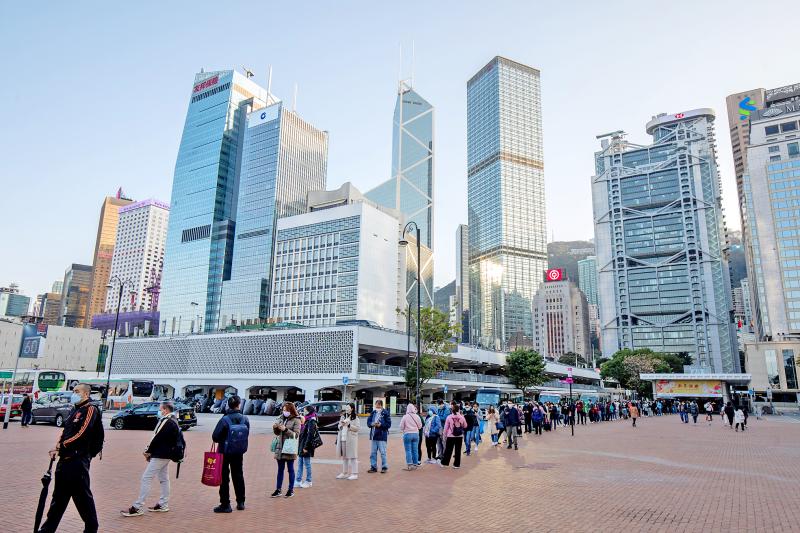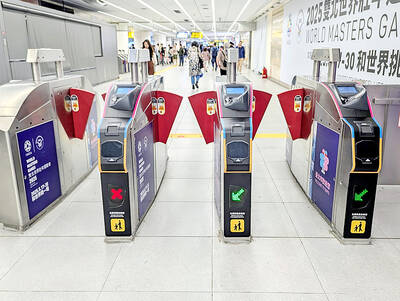The Chinese Communist Party (CCP) is implementing policies aimed at absorbing Hong Kong professionals into its “Greater Bay Area” plan, the Mainland Affairs Council (MAC) said in its latest evaluation report on Hong Kong’s status.
Since the introduction of the National Security Law in the territory in 2020, the council is required to submit quarterly reports to the legislature on Hong Kong’s status as a semi-autonomous region and Taiwan’s humanitarian efforts to assist Hong Kong residents.
Under Chinese President Xi Jinping (習近平), Beijing aims to transform the coastal region along the Pearl River Delta into a “high-tech megalopolis to rival California’s Silicon Valley,” linking Hong Kong, Macau, Shenzhen and Guangzhou, Bloomberg wrote on Feb. 19, 2019.

Photo: Bloomberg
The council said that Beijing had been using incentives to strengthen absorption and control of Hong Kong talent into the “common market” of the Greater Bay Area.
Beijing was implementing numerous measures to more closely integrate Hong Kong and Macau with mainland China, it added.
Since 2020, foreign investment in Hong Kong has dropped 3.1 percent, from 1,504 businesses to 1,457, the report said, adding.
The number of US businesses investing in the territory fell from 282 to 254 — the largest drop since 2003.
Over the same period, mainland Chinese investment grew 6 percent annually, with 252 companies moving into the territory, the report said.
Legislation introduced by Beijing in December last year requires law students in Macau and Hong Kong to study “Xi Jinping thought” as part of the bar exam, it said.
‘POLITICAL THRESHOLD’
“Similar political thresholds might be set for other professions in the future,” a source said. “The Hong Kong Government echoes CCP policy on integration.”
Hong Kong Chief Executive Carrie Lam (林鄭月娥) has said that suburban residential areas would be built in the northern and northwestern areas of Hong Kong’s New Territories over the next two decades, linking the territory and Shenzhen at seven ports of entry, the source said.
“The exodus of foreign capital from Hong Kong is partially a reflection of the global economy, but a large part of it is due to political factors,” the source said. “Since October last year, there have been a spate of rulings, with people each being imprisoned for years for allegedly breaching the National Security Law.”
Citing the arrest and imprisonment last year of Hong Kong media tycoon Jimmy Lai (黎智英), the source said that the CCP was targeting outspoken members of the media and now requires all those hired at Hong Kong’s public schools to pass the Basic Law test.
More than 90 percent of the territory’s schools have established groups to coordinate work related to the National Security Law, the source said.
Following the “patriots only” Hong Kong Legislative Council election on Dec. 19 last year, more than two-thirds of council members are also CCP or Chinese People’s Political Consultative Conference members, the source said.
“Socially controversial bills will now be easily passed in Hong Kong,” the source said. “President Tsai Ing-wen (蔡英文) in her New Year speech at the start of January said the human rights situation in Hong Kong is worrying.”

A magnitude 6.4 earthquake struck off the coast of Hualien County in eastern Taiwan at 7pm yesterday, the Central Weather Administration (CWA) said. The epicenter of the temblor was at sea, about 69.9km south of Hualien County Hall, at a depth of 30.9km, it said. There were no immediate reports of damage resulting from the quake. The earthquake’s intensity, which gauges the actual effect of a temblor, was highest in Taitung County’s Changbin Township (長濱), where it measured 5 on Taiwan’s seven-tier intensity scale. The quake also measured an intensity of 4 in Hualien, Nantou, Chiayi, Yunlin, Changhua and Miaoli counties, as well as

Credit departments of farmers’ and fishers’ associations blocked a total of more than NT$180 million (US$6.01 million) from being lost to scams last year, National Police Agency (NPA) data showed. The Agricultural Finance Agency (AFA) said last week that staff of farmers’ and fishers’ associations’ credit departments are required to implement fraud prevention measures when they serve clients at the counter. They would ask clients about personal financial management activities whenever they suspect there might be a fraud situation, and would immediately report the incident to local authorities, which would send police officers to the site to help, it said. NPA data showed

ENERGY RESILIENCE: Although Alaska is open for investments, Taiwan is sourcing its gas from the Middle East, and the sea routes carry risks, Ho Cheng-hui said US government officials’ high-profile reception of a Taiwanese representative at the Alaska Sustainable Energy Conference indicated the emergence of an Indo-Pacific energy resilience alliance, an academic said. Presidential Office Secretary-General Pan Men-an (潘孟安) attended the conference in Alaska on Thursday last week at the invitation of the US government. Pan visited oil and gas facilities with senior US officials, including US Secretary of the Interior Doug Burgum, US Secretary of Energy Chris Wright, Alaska Governor Mike Dunleavy and US Senator Daniel Sullivan. Pan attending the conference on behalf of President William Lai (賴清德) shows a significant elevation in diplomatic representation,

The Taipei MRT is to begin accepting mobile payment services in the fall, Taipei Rapid Transit Corp said on Saturday. When the company finishes the installation of new payment units at ticketing gates in October, MRT passengers can use credit cards, Apple Pay, Google Pay and Samsung Pay, the operator said. In addition, the MRT would also provide QR payment codes — which would be compatible with Line Pay, Jkopay, iPass Money, PXPay Plus, EasyWallet, iCash Pay, Taiwan Pay and Taishin Pay — to access the railway system. Currently, passengers can access the Taipei MRT by buying a single-journey token or using EasyCard,